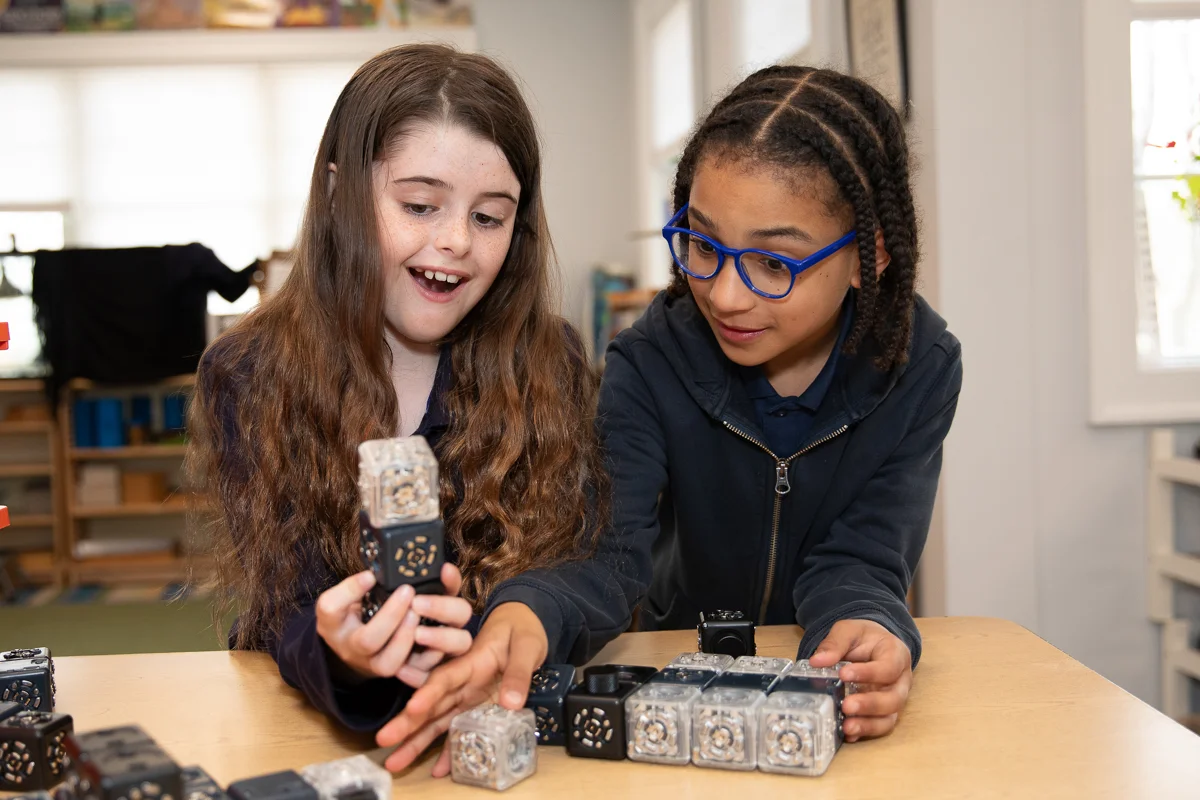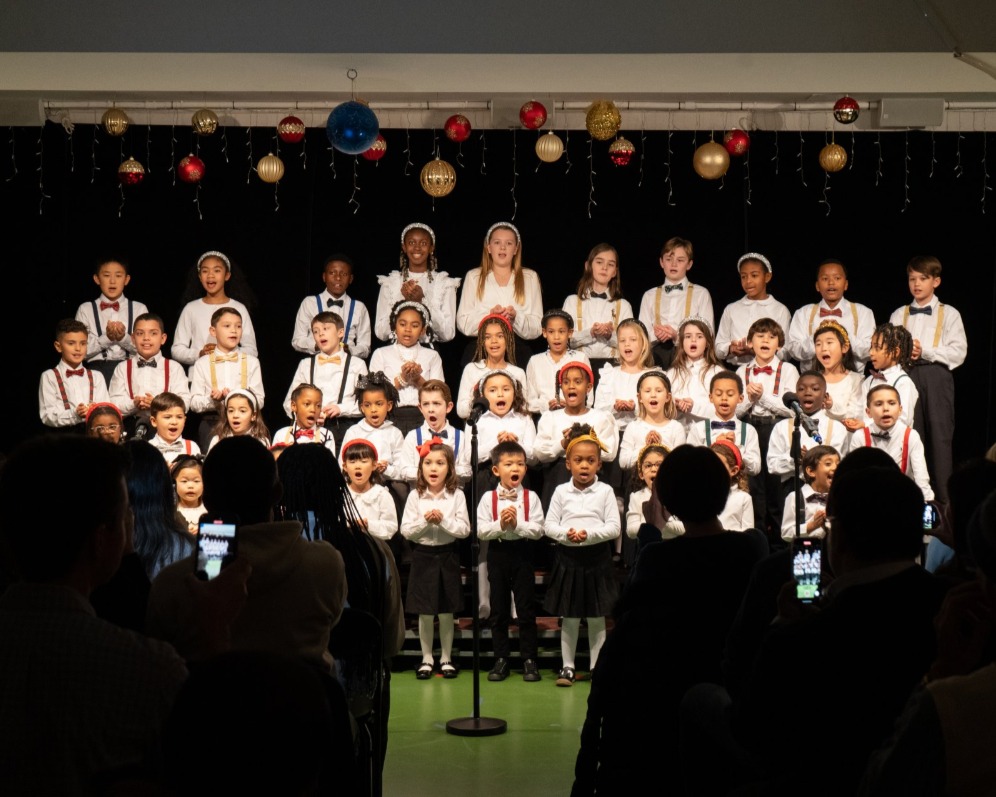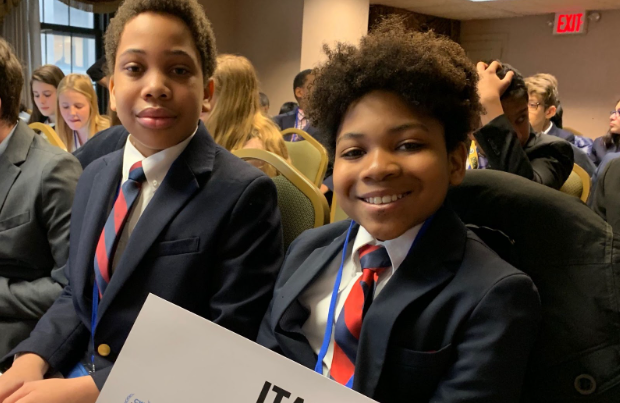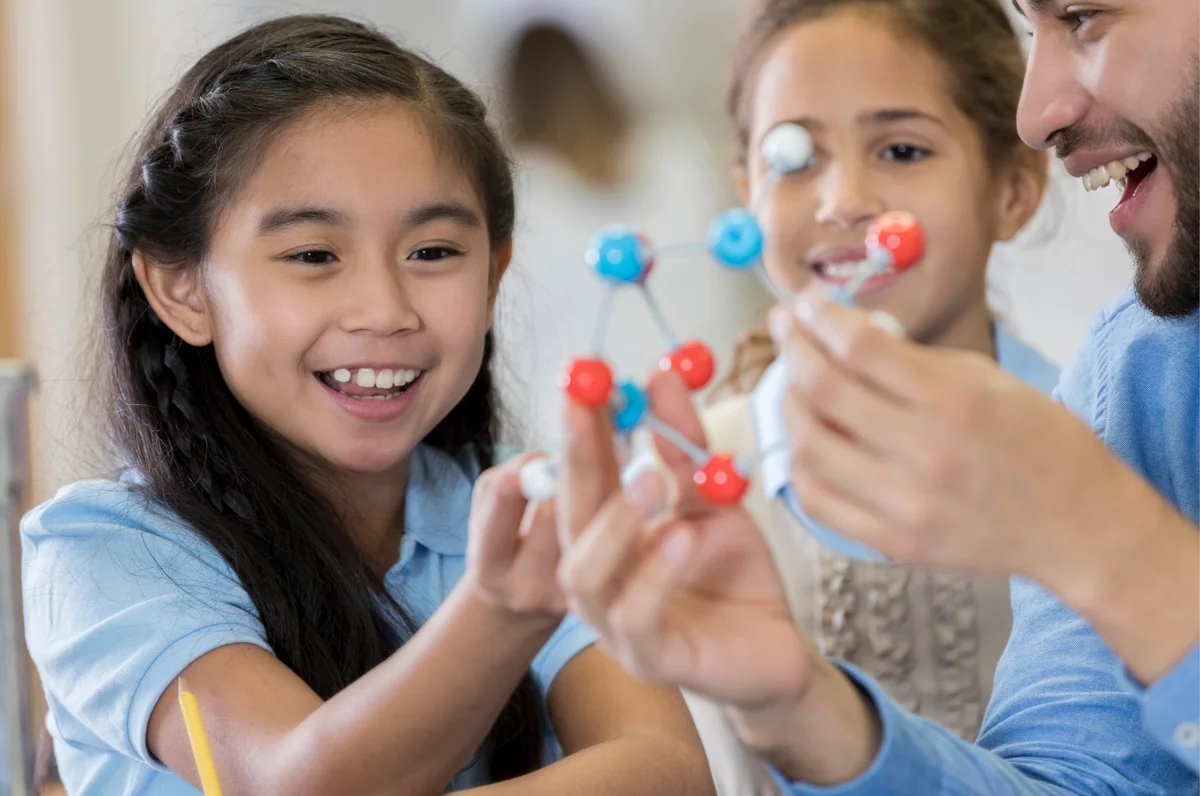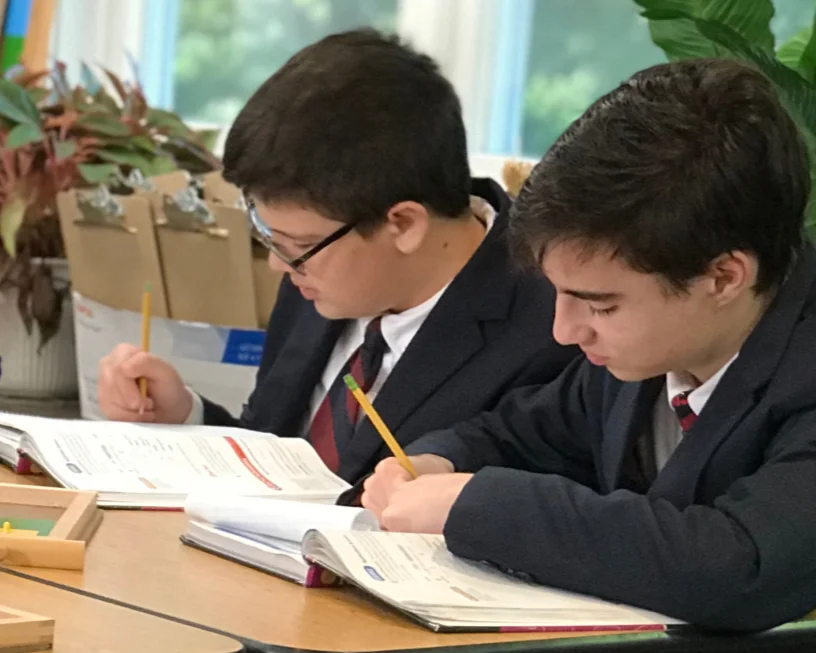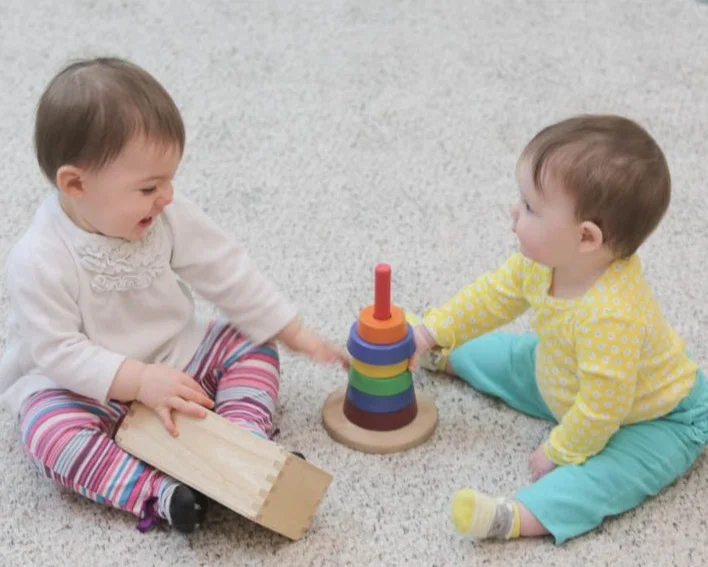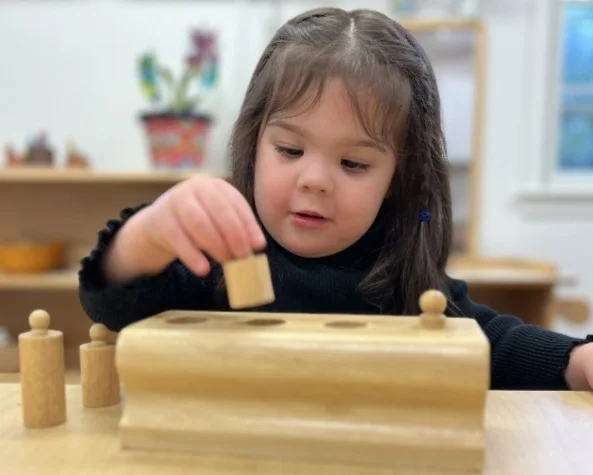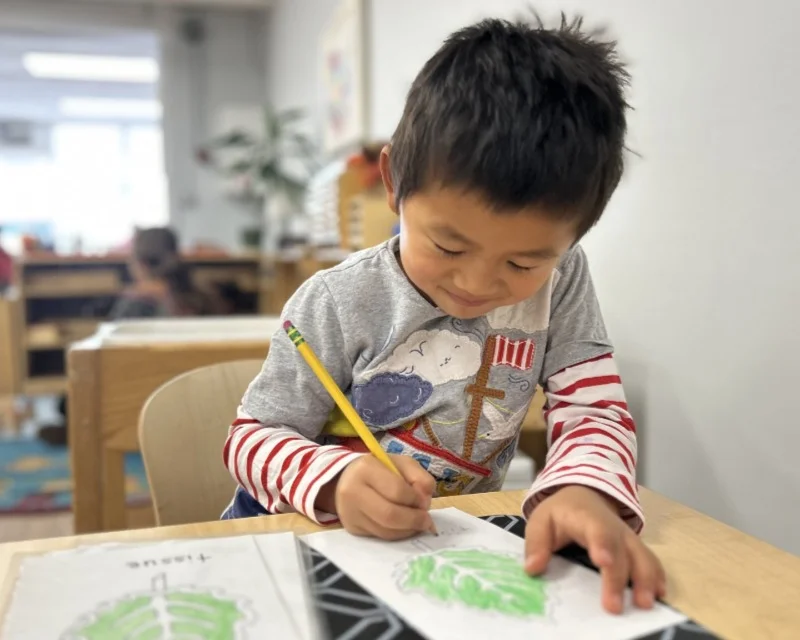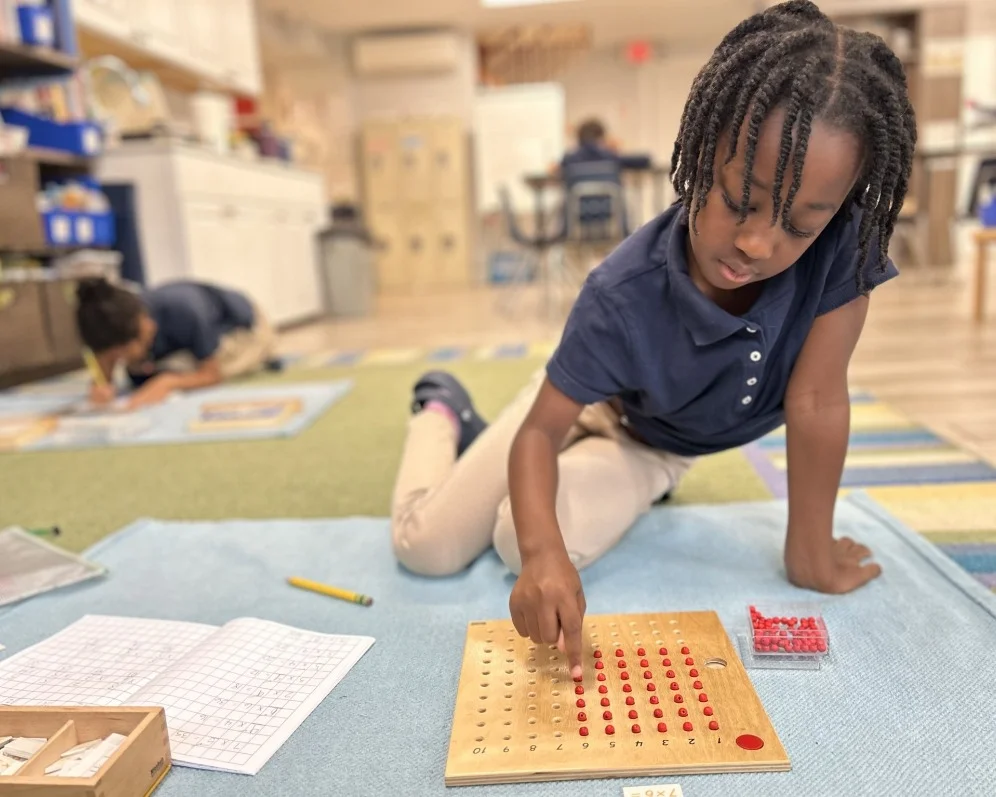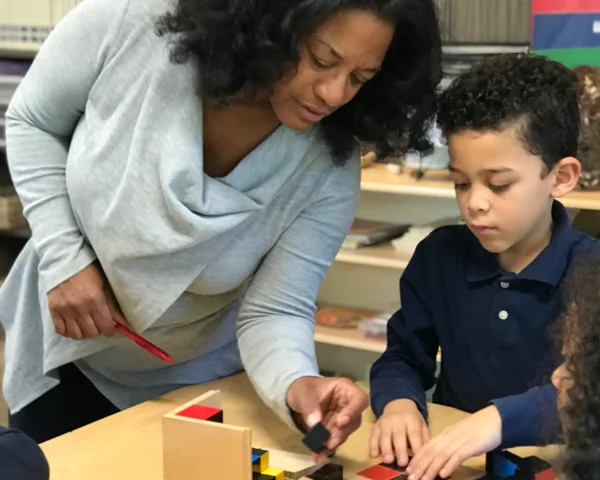BEST PRIVATE ELEMENTARY SCHOOL NEAR M- E
HUDSON COUNTRY MONTESSORI UPPER ELEMENTARY PROGRAM
At Hudson Country Montessori, we know that as a parent, you want your child to grow into a confident, independent learner who is excited about exploring new ideas. Our Upper Elementary (Grades 4-5) program is designed to do just that—guiding students as they develop critical thinking, problem-solving skills, and intellectual independence while navigating the challenges of early adolescence.
By the time children reach Upper Elementary, most have already developed a capacity for reasoning and independent study. Our teachers act as guides, helping students refine these skills so they can pursue their own academic interests with confidence. This approach nurtures intellectual curiosity, builds strong work habits, and prepares students for success in middle school, high school, and beyond.
Learning in Upper Elementary is hands-on and project-based, often integrating multiple disciplines at once. These experiences help students see how academic concepts apply to the real world, while also teaching the value of collaboration and multi-disciplinary problem solving. Teachers encourage students to explore their passions while supporting them in subjects that are less naturally engaging—helping them build resilience and flexibility in their learning.
Social growth is equally important. With smaller class sizes, freedom of movement, and collaborative projects, students develop strong social skills, learn to work with peers who think and act differently, and form meaningful friendships.
The partnership between teachers, students, and families ensures that every child feels emotionally supported and safe, creating an environment where they can focus on mastering an advanced, stimulating curriculum while growing academically, socially, and emotionally.
“The adolescent must never be treated as a child, for that is a stage of life that he has surpassed. It is better to treat an adolescent as if he had greater value than he actually shows than as if he had less and let him feel that his merits and self-respect are disregarded.”
–Dr. Maria Montessori
Blended Socratic and Constructivist Approach
At the Elementary and Middle School levels, Montessori is best described as a blend of the Socratic Method and the Constructivist approach. In the Socratic method the teacher asks questions to prompt students to think, problem solve and learn through reflection and inquiry. The constructivist approach uses hands-on project based, student-directed problem solving that challenges students with incrementally more difficult and more interesting work as they explore and discover their way through the curriculum.
To understand how our classrooms work, think of them like a science laboratory where everyone is working on different parts of a project. Later, they come together to share what they have learned in order to solve a problem or form an opinion based on everyone’s information. It's a fun and interactive way for students to develop problem-solving skills. With the teacher's guidance, they also learn to connect different subjects. Besides thinking skills, sharing information with classmates helps students learn to present themselves as articulate and engaging people that can communicate and collaborate with others. In these discussions, the teacher asks open-ended questions to spark curiosity and encourage conversation.
By combining the Socratic and constructivist methods, we prepare students to be at the center of their own learning journey. Through small and large group work, students learn to support one another and test developing points of view without fear of being judged. This creates a warm and encouraging learning community where every child can thrive.
Academic Engagement Drives Learning
n Upper Elementary and Middle School, students are ready for bigger questions — and they want real answers. When a topic sparks their curiosity, they don’t just skim the surface; they dive deep, research thoughtfully, and often choose to work alongside classmates because collaboration feels natural at this age. With stronger reasoning skills and growing independence, they’re able to investigate ideas in a way that’s similar to the depth you’d see in programs like the International Baccalaureate. Our daily rhythm protects long stretches of uninterrupted work time, so students can get into “the zone” and stay there, following self-chosen studies that matter to them. Montessori at this level is about depth over speed: students learn how to analyze, solve problems, think critically, and reflect on what they discover. Over time, they don’t just learn content — they learn how they learn. And once they know that, they carry the confidence to tackle new challenges, inside and outside the classroom.
Student Engagement Drives Learning
By the time students reach Upper Elementary and Middle School, they don’t want learning done to them — they want learning they can help shape. They’re full of emerging passions, and when we give them room to explore, they surprise even themselves with how far they’re willing to go. Our role is to guide that drive with structure: the schedule intentionally includes generous blocks of independent study so students can pursue meaningful work without constant breaks or resets. In these project cycles, they practice choosing a focus, digging into research, and pushing their thinking beyond the obvious. As they test ideas and reflect on outcomes, they build the habits that make learning stick: strong analysis, creative problem-solving, and confident critical thinking. Just as importantly, they learn the real-life skills behind success — setting goals, planning a path forward, managing time and materials, and owning the results. With supportive teachers beside them, students begin to see a powerful truth: if they can learn this way, they can learn anything.
Becoming a Global Citizen
It is the nature of our Upper Elementary and Middle School students to take an interest in society beyond his/her self, family, and school. Students at this level become very interested in how societies work. They use their evolving social awareness to discuss and explore difficult social topics such as global warming, food insecurity, poverty, religion, equity, and justice. They are also challenged to use empathy and compassion when developing solutions to complex social problems. Through discussions about social issues and by serving the community, Upper Elementary students begin to answer the fundamental questions all adolescents face: “Who am I?” and “Who do I want to be?” in the context of our broader global society.
Social Development in a Small (Extended Family) Setting–Self Governance?
Our weekly “Community Meetings'' provide students with a platform in which they can learn to self-govern with the support and coaching of the teacher. Through these meetings, the group acquires a deep understanding of governance on a broader local, national, and global scale by resolving their own classroom issues. By learning to manage their own individual behaviors, the group learns to promote teamwork and therefore mitigates most of the typical anti-social behaviors of pre-teens. Of course, all pre-teens are prone to lapses of judgment, so the Upper Elementary teacher sometimes needs to remind the students to conform to their self-governance structures or to recommend changes to the structures at the next Community Meeting.
Like all emerging and young adolescents, our students are searching for their place in society. And, they have a need to “fit in” with their peers because of their natural insecurities and emerging hormones. The nature of the Montessori classroom supports this need to fit in while helping the student reveal what makes them special and how they can offer something unique that will enrich the group as a whole.
Students working in large and small groups form close friendships with one another and they help each other navigate social norms and resolve conflicts. They learn to appreciate the cognitive and cultural similarities/differences among their friends and become strong advocates for one another with the potential of becoming life-long friends.
Multi-age Classroom
Modeled after the typical family structure with multi-age children, the Montessori learning environment is both collaborative and competitive. Younger students look up to their older peers and are inspired to tackle more advanced work, while older students develop leadership skills by mentoring and teaching their younger classmates. This family-like atmosphere helps build a close-knit community and fosters a strong commitment to learning.
Our teachers form deep connections with each child over the years, truly getting to know them and understanding their unique needs. This close relationship extends to parents as well, creating a strong partnership focused on supporting your child's physical, social, emotional, and cognitive development. Together, we ensure that your child thrives in all aspects of their growth.
Social Learning
There is a limit to how much intense focus a young student can apply to their work. At some point, their brain gets tired, and they need to take a break. When their brains need a break, they often wander over to a friend to see what they're working on and chat about their projects. This friendly interaction allows each child to learn something new about their friend's work. Sometimes these conversations spark new interests, and other times they simply expand each student's knowledge.
In our Lower Elementary classrooms, students are very aware of what their peers are working on and why they find it so fascinating. This shared enthusiasm makes learning in Montessori’s “open classroom” environment incredibly engaging. The excitement and curiosity of friends about their own projects creates a vibrant and dynamic learning atmosphere.
While we encourage positive social interaction among our students, we are concerned about the things students learn from others on social media. Consequently, cell phone use is prohibited during the school day and social media sites are blacklisted on the school’s internet (except for specific computers in the school office).
STEM/STEAM
Hudson Elementary and Middle School students dive into big projects that lead to big learning. While these activities take time and practice, they develop important study skills like resilience, grit, problem-solving, and executive function. And, in the end, big projects give students a wonderful sense of personal competence, self-esteem, and self-satisfaction. Our project-based curriculum challenges students with activities that typically integrate all the STEAM disciplines at once. This means your child will get to explore a wide range of interests and learn how different subjects connect to each other. Students also get to share their passions and discoveries with others through our science fairs, invention conventions and various elective "Studio Programs." These programs delve deeper into the various STEAM topics so that students can explore topics of specific interest in a small group setting alongside friends who share the same interests and who also want to explore them more deeply:
- Science: Our curriculum promotes an understanding of the natural world and the people in it. Physical science, biological science and social science is at the core of our curriculum.
- Technology: We believe technology should be used as a tool to achieve outcomes across all academic disciplines and should help enhance learning across the curriculum. Technology is used in our classroom to enhance the development of creative thinking, logic, design, and problem-solving skills. Students begin basic coding, search and creative work in Lower Elementary and practical applications of technology through coding, robotics, physics and maker-space projects in Middle School.
- Engineering: The Montessori method is a hands-on method and project-based learning requires some sort of “doing” that involves engineering.
- Art: Fine art is an expression of creativity and out of the box thinking. It involves a variety of media and techniques including digital media. Fine art teaches students to see the world with nuance and to embrace their personal view of reality. Performance art provides students the opportunity to adopt a variety of roles as communicators. Through public speaking and a variety of performances where they are part of a team our students are very comfortable addressing audiences in large and small venues. Commercial art is a sense of aesthetics that is incorporated into all of our project work. Our Music program teaches students to appreciate and understand analog and digital music. Orchestration is an essential part of the program that teaches collaboration and the importance of teamwork. Art, music, and performance classes are offered by our “Specials'' teachers.
- Math: Montessori math is learned through manipulative materials that make abstract math concepts easy to understand. Even advanced math concepts are fun to learn when understanding is enhanced by the Montessori math materials.
The Gifted Child
While every child is born with intrinsic talents, some students are endowed with special gifts in one or more domains. In the Montessori classroom, we encourage our students to fully express their strengths and develop strong learning skills in the areas of their natural ability and interest. Conversely, our individualized curriculum also makes it possible to nurture gifts by emphasizing growth mindset in areas they find more challenging or less interesting. The result is a student who is generally well rounded with advanced abilities in one or more areas.
Because students with higher aptitudes are not “held back” waiting for their peers to “catch-up”, they can excel in their areas of strength to the extent of their ability.
Embracing Neurodiversity
Dr. Montessori did not have the benefit of functional MRIs to tell her how the brain works, but she did spend countless hours observing that every student learns differently. To help all her students, whether they were advanced learners or more typical learners, she developed an individualized method of teaching that uses multiple modes of learning (auditory, visual, tactile/kinetic). To complement her system, she developed specialized multi-sensory teaching materials to facilitate learning across all subjects. By helping students utilize their strongest learning modality (strengths based education), she was able to teach a broad range of learners more quickly and with greater understanding of the material being taught.
Montessori pedagogy at Hudson can be effective for a broad range of neurotypical and neurodivergent students. However, to be successful at Hudson, students must have the ability to be productive, independent learners and they must comport themselves with age appropriate decorum. Our classrooms are friendly and supportive, giving students the freedom to move around and choose their own work. Our students have responsibility for their education and this sense of agency causes students to be more excited about learning.
Diversity
We believe in the value of diversity and strive to promote a culture of respect for differences because those differences make our school a richer and more interesting place to learn. Our school communities mirror the diversity of our very diverse local communities.
Hudson has always been a very diverse school. Our founder, Musya Meyer, was a WWII refugee and educator who believed it was important for all children to learn about and appreciate the many different cultures that make up America’s pluralistic society. She believed that when all members of the school community share their cultural heritage, traditions and practices with one another, children learn to respect and appreciate the similarities and differences of the human family. To that end, we celebrate the diversity of all of our school families with interest, respect, and kindness through the many celebrations held throughout the year.
In addition to having classroom materials and lessons that reflect the diversity of our students, Hudson offers Spanish language and cultural lessons twice a week to our Elementary and Middle School students. This helps give them a global perspective and an appreciation for different cultures.
Although Hudson and Montessori education are secular (not religious), we promote strong character values without infusing any particular theology or ideology. We believe that it is important to expose our students to diversity of thought so they learn to develop their own thoughts.
We ask all families to practice kindness and respect for others and to engage their children at home to promote their own family values and ideals.
Mastery & Grades (Standards Based)
We use a progressive, “standard-based” approach when grading students. It is based on the premise that learning is a cumulative process and that whatever students learn today will serve as a foundation for their learning tomorrow. In order to be successful, students must master the content standards at each step along their learning journey.
In a Montessori classroom, the difference between one student and another is the number of standards each student has mastered. Since every student understands the significance of all the work they are doing, assigning “grades” to student work is unnecessary. Standards-based learning is consistent with the concept of “Growth Mindset” and it is being explored by an increasing number of elite private high schools and colleges that believe challenging students with standards is more important than determining their capability with letter grades.
There are a few areas of the curriculum that simply require rote memorization like math facts, spelling and vocabulary. To familiarize students with tests/grades we use traditional testing to reinforce learning in those skill areas. At the Middle School level we broaden the use of tests and grades, to prepare students for their transition to traditional high schools.
Standardized Assessment (Sort of)
We believe that taking standardized tests is a skill that all students must develop to succeed at higher levels of education. Therefore, we feel that early no/low stakes standardized testing helps students take tests without the anxiety attached to “high-stakes outcomes.”
In order to assess our students’ learning and growth, we use a computer-based tool called MAP Growth. MAP Growth is designed to test student knowledge against the standards of traditional education.The MAP Growth test is a computer based adaptive test that responds to answers given by the student. Correct answers are followed by more difficult questions and incorrect answers are followed with less difficult questions. In the end, no two children will receive the same test, so it is impossible to “teach to the test'' and there are no “normed percentile rankings.” However, the algorithm does provide an assessment of student progress/ability.
The MAP assessment is similar to the new digital SAT test. We use testing primarily to give students practice in testing and to assess our curriculum against the standard outcomes of traditional education.
Families are welcome to opt-out of standardized assessment/testing without judgment.
Multisensory Learning Using Montessori Materials
At the Upper Elementary level, Montessori continues to use multi-sensory learning to engage students in a way that makes learning more dynamic and effective. Here’s how it works:
- Students use a variety of specially designed tactile materials to explore complex concepts in subjects like math, language, science, and geography. The materials are designed to organize abstract concepts and operations that are both visual and tactile. Dr. Montessori said frequently that the hand is the pathway to the brain so much of learning is done with our hands. The materials, like puzzles, are designed to make a visual and muscular impression that teach problem solving, systems thinking, and critical thinking.
- Charts, diagrams, and visual timelines are used to help students visualize and better understand abstract concepts. This can be particularly helpful in subjects like history and biology.
- Teachers incorporate discussions, storytelling, and presentations to cater to auditory learners. Discussion helps students develop strong listening skills because verbal presentations are always interactive.
- Movement-based activities, such as role-playing historical events or conducting science experiments, allow students to learn by doing.
- Group work and collaborative projects encourage students to use multiple senses as they discuss, build, and create together. This not only enhances learning but also builds social and communication skills.
By integrating these multi-sensory methods, Montessori education ensures that students at the Upper Elementary level can grasp complex ideas in a way that suits their individual learning styles. This approach makes learning more engaging and helps students develop a deeper understanding of the material.
Accreditations
Accreditation is a rigorous process of school quality validation that is granted by an organization that is authorized by a State or national authority to grant accreditation status. Hudson Country Montessori School is Accredited by the:
- American Montessori Society (AMS), which is the largest Montessori accrediting body in the United States and the world. Accreditation by AMS demonstrates our commitment to high quality Montessori education.
- New England Association of Schools and Colleges (NEASC), is the oldest of the six regional accrediting associations. Accreditation by NEASC demonstrates our commitment to high quality education from the perspective of an association focussed on high quality private education without regard to philosophy or pedagogy.
Calendar/Schedule
The Elementary/Middle School calendar includes a school year program, a summer camp program and an extended day program offering flexibility for families. Student may enroll in any of the following programs:
- School Year Program: Students enrolled in the school year program make a commitment for the entire school year. The calendar for the school year program loosely follows the Danbury or New Rochelle Public school calendar.
- Summer Camp Program: Our New Rochelle program offers 8 weeks of summer camp while our Danbury campus offers a 9 week summer program. Students enrolled in the summer camp program can enroll for as few as two consecutive weeks.
- Extended Day/Extended Year: Students enrolled in Hudson’s school or camp program may enroll in our extended day and/or vacation school programs.
- Year Round Program: Our Year Round program offers a preferential tuition rate for students that participate in our school, camp and extended day/year programs.
Ready to Move Up: Transition from Upper Elementary to Middle School
As your child moves from Upper Elementary to Middle School, they step into a stage of learning that emphasizes independence, critical thinking, and leadership. This is a time when students take on more complex, real-world projects, tackle abstract concepts, and collaborate across disciplines—preparing them for the academic and social challenges of adolescence.
Our Middle School program builds on the strong foundation established in Upper Elementary, guiding students as they refine their problem-solving skills, intellectual curiosity, and social-emotional growth. Through hands-on exploration of advanced math, science, humanities, and technology, students gain confidence in their reasoning, develop effective collaboration skills, and continue to discover their unique strengths and passions.
At Hudson, we ensure that every student is academically challenged, emotionally supported, and fully prepared to thrive in Middle School and beyond. Our teachers act as guides, helping students navigate this important transition with confidence and resilience, while fostering the independence and leadership skills they’ll carry throughout their academic journey.
Click below to learn more about our Middle School program and see how Hudson helps students grow, lead, and excel at every stage of their Montessori education.
At Hudson Country Montessori, we’re committed to supporting your child’s development every step of the way. From infant care and toddler learning through preschool and kindergarten in our primary program, to elementary with both our lower elementary and upper elementary programs , and onto our middle school, we provide a seamless, nurturing path that grows with your child. Schedule your tour today so we can show you how your child can thrive both emotionally and academically here!
BEST PRIVATE SCHOOL NEAR ME


